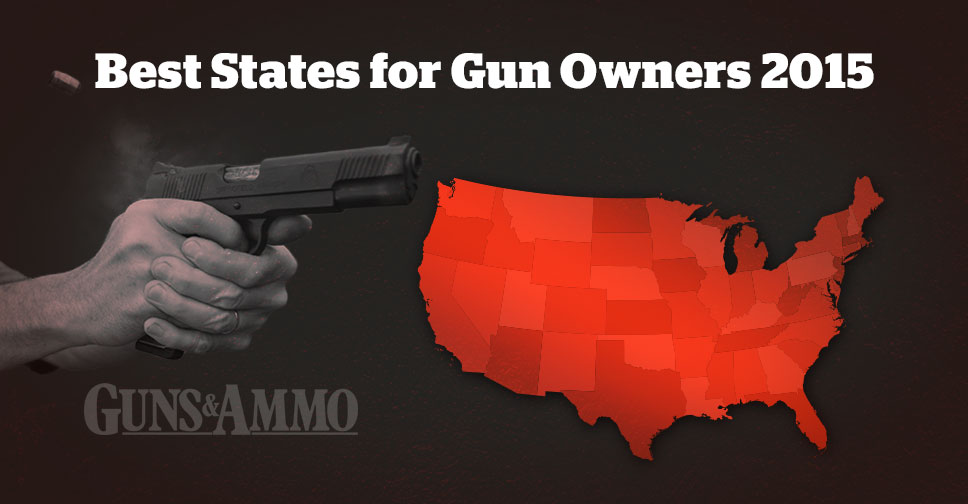
(WORST TO FIRST)
51. Washington, D.C.
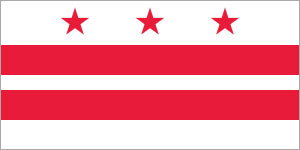 While
D.C. is hardly a home for America’s gun owners, things have improved
slightly in the last few years. After the U.S. Court of Appeals ruled
that the District’s ban on carrying a firearm outside the home for
self-defense was unconstitutional, D.C. abandoned its attempt to enforce
an outright ban on the carrying of handguns. Instead, the District is
in the process of imposing a “may issue” permit system that is unlikely
to issue many, if any, permits to law-abiding citizens within the city.
D.C. residents must still register all firearms with the Metro Police
Department, and legal shooting opportunities within the District are
nonexistent. If you’re a gun owner looking to move to the D.C. area,
take a hard look at Northern Virginia instead.
While
D.C. is hardly a home for America’s gun owners, things have improved
slightly in the last few years. After the U.S. Court of Appeals ruled
that the District’s ban on carrying a firearm outside the home for
self-defense was unconstitutional, D.C. abandoned its attempt to enforce
an outright ban on the carrying of handguns. Instead, the District is
in the process of imposing a “may issue” permit system that is unlikely
to issue many, if any, permits to law-abiding citizens within the city.
D.C. residents must still register all firearms with the Metro Police
Department, and legal shooting opportunities within the District are
nonexistent. If you’re a gun owner looking to move to the D.C. area,
take a hard look at Northern Virginia instead.
50. New York
 All
we can say that’s positive about gun laws within the Empire State is
that they haven’t gotten any worse this last year. After extensive gun
control efforts in previous years, the New York legislature actually
killed two anti-gun bills this session, one to ban .50-caliber rifles
and the other requiring gun owners to lock up firearms in their homes.
New York remains a very difficult state for gun owners, with mandatory
handgun licensing, magazine capacity limits and a total ban on NFA
items. Carry permits are granted on a “may issue” basis, and obtaining
one is no easy task. You’ll still find some shooting sports activity in
upstate areas, but the overall climate for gun owners is so bad that
even industry giant Remington Arms Company is packing its bags for
greener pastures.
All
we can say that’s positive about gun laws within the Empire State is
that they haven’t gotten any worse this last year. After extensive gun
control efforts in previous years, the New York legislature actually
killed two anti-gun bills this session, one to ban .50-caliber rifles
and the other requiring gun owners to lock up firearms in their homes.
New York remains a very difficult state for gun owners, with mandatory
handgun licensing, magazine capacity limits and a total ban on NFA
items. Carry permits are granted on a “may issue” basis, and obtaining
one is no easy task. You’ll still find some shooting sports activity in
upstate areas, but the overall climate for gun owners is so bad that
even industry giant Remington Arms Company is packing its bags for
greener pastures.
49. New Jersey
 New
Jersey gun owners had a victory in 2014 when Gov. Chris Christie vetoed
a bill that would lower the state’s 15-round magazine capacity to 10
rounds. Another moral win occurred when the governor pardoned Shaneen
Allen, a woman caught up in New Jersey’s gun laws when she made the
mistake of crossing the bridge from Pennsylvania. A final victory came
when the state’s attorney general ruled that the 2002 “Smart Gun” law
(requiring handguns to be made with certain technology when it is
commercially available) has not been triggered by “smart” prototypes in
the marketplace. Ownership of tactical rifles is tightly regulated in
New Jersey, and state law bans suppressors. Carry permits are “may
issue” and are not readily available.
New
Jersey gun owners had a victory in 2014 when Gov. Chris Christie vetoed
a bill that would lower the state’s 15-round magazine capacity to 10
rounds. Another moral win occurred when the governor pardoned Shaneen
Allen, a woman caught up in New Jersey’s gun laws when she made the
mistake of crossing the bridge from Pennsylvania. A final victory came
when the state’s attorney general ruled that the 2002 “Smart Gun” law
(requiring handguns to be made with certain technology when it is
commercially available) has not been triggered by “smart” prototypes in
the marketplace. Ownership of tactical rifles is tightly regulated in
New Jersey, and state law bans suppressors. Carry permits are “may
issue” and are not readily available.
48. Massachusetts
 In
case you thought the Bay State’s gun laws couldn’t get any worse, the
legislature proved that it had room to ban more in 2014. Last year,
those living in Massachusetts saw the enactment of legislation that
allows mandatory firearm licenses to be denied for any arbitrary basis
of “risk,” permitting local-
In
case you thought the Bay State’s gun laws couldn’t get any worse, the
legislature proved that it had room to ban more in 2014. Last year,
those living in Massachusetts saw the enactment of legislation that
allows mandatory firearm licenses to be denied for any arbitrary basis
of “risk,” permitting local-
government abuse. Licenses are required for the ownership of all
firearms, and tactical-looking rifles are all but banned unless
grandfathered and registered. The state’s magazine capacity limit is 10
rounds. Carry permits are “may issue,” but they are actually obtainable.
The state police can issue temporary nonresident permits.
47. Hawaii
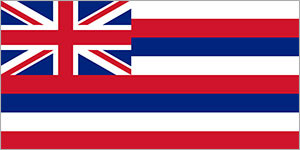 Thomas Magnum may have rolled around the islands with a 1911
stashed in his micro shorts in the 1980s TV hit “Magnum P.I.,” but
you’re unlikely to find a Hawaiian do this under the state’s tough “may
issue” system. Hawaii’s gun laws are very restrictive. Permits to
acquire are required for all firearms and were denied to legal resident
aliens until a federal court intervened this year. A 10-round magazine
restriction is on the books along with a complete ban on NFA items.
Self-defense laws are mediocre. If you’re a hunter, there are some
surprisingly good outdoor opportunities, which may be the only silver
lining in paradise.
Thomas Magnum may have rolled around the islands with a 1911
stashed in his micro shorts in the 1980s TV hit “Magnum P.I.,” but
you’re unlikely to find a Hawaiian do this under the state’s tough “may
issue” system. Hawaii’s gun laws are very restrictive. Permits to
acquire are required for all firearms and were denied to legal resident
aliens until a federal court intervened this year. A 10-round magazine
restriction is on the books along with a complete ban on NFA items.
Self-defense laws are mediocre. If you’re a hunter, there are some
surprisingly good outdoor opportunities, which may be the only silver
lining in paradise.
46. California
 While
many states have backed away from efforts to restrict the rights of
their gun owners, California is moving full steam ahead. Although much
of California’s geography is true rural America, the big cities dominate
the political landscape and enact strict gun laws accordingly. Gov.
Jerry Brown signed five anti-gun bills into law since G&A last
prepared this report. On the bright side, the 9th Circuit ruled in favor
of gun owners in the Peruta v. San Diego case, which relates
to the constitutionality of the restrictive carry permit policies in
many of the state’s counties. That case will be heard by a nine-member
panel in June 2015 and could end up in the U.S. Supreme Court.
California uses a restrictive “approved” handgun list that makes some
models (many already discontinued by the manufacturer) available in the
state, and the mere act of shipping a firearm to a dealer in California
can be complicated. A 10-day waiting period is imposed on all firearms
acquisitions, and registration is required. Tactical-looking rifles are
restricted as are standard-capacity magazines not grandfathered in. Mere
possession of certain magazines is banned in some municipalities, and
most NFA items, including suppressors, are not allowed.
While
many states have backed away from efforts to restrict the rights of
their gun owners, California is moving full steam ahead. Although much
of California’s geography is true rural America, the big cities dominate
the political landscape and enact strict gun laws accordingly. Gov.
Jerry Brown signed five anti-gun bills into law since G&A last
prepared this report. On the bright side, the 9th Circuit ruled in favor
of gun owners in the Peruta v. San Diego case, which relates
to the constitutionality of the restrictive carry permit policies in
many of the state’s counties. That case will be heard by a nine-member
panel in June 2015 and could end up in the U.S. Supreme Court.
California uses a restrictive “approved” handgun list that makes some
models (many already discontinued by the manufacturer) available in the
state, and the mere act of shipping a firearm to a dealer in California
can be complicated. A 10-day waiting period is imposed on all firearms
acquisitions, and registration is required. Tactical-looking rifles are
restricted as are standard-capacity magazines not grandfathered in. Mere
possession of certain magazines is banned in some municipalities, and
most NFA items, including suppressors, are not allowed.
45. Connecticut
 Connecticut
residents have witnessed serious erosions in their state’s gun laws
over the past few years, and the trend continues this legislative
session. Licensing requirements are in place for all firearms, and
handgun owners are required to have a permit to possess a handgun
anywhere outside the home. Mere possession of an unregistered magazine
holding more than 10 rounds is a felony, and tactical rifles must be
registered and grandfathered in. The state has decent use-of-force
statutes including the Castle Doctrine. Carry permits are “may issue”
but are generally given if an applicant meets certain criteria. Permits
from other states are not recognized. Both suppressors and machine guns
are legal if registered with both ATF and in-state authorities.
Connecticut
residents have witnessed serious erosions in their state’s gun laws
over the past few years, and the trend continues this legislative
session. Licensing requirements are in place for all firearms, and
handgun owners are required to have a permit to possess a handgun
anywhere outside the home. Mere possession of an unregistered magazine
holding more than 10 rounds is a felony, and tactical rifles must be
registered and grandfathered in. The state has decent use-of-force
statutes including the Castle Doctrine. Carry permits are “may issue”
but are generally given if an applicant meets certain criteria. Permits
from other states are not recognized. Both suppressors and machine guns
are legal if registered with both ATF and in-state authorities.
44. Maryland
 You
can bet that some Baltimore residents are rethinking their state’s
highly restrictive gun laws in the wake of recent mob violence. Maryland
actually ranked behind New York in G&A’s “Best States for CCW”
list, and we have since learned that Beretta is leaving the state for
more gun-friendly Tennessee, which speaks volumes. Carry permits in
Maryland are “may issue” and rare. Handguns must be registered and
require a permit to own, though rifles and shotguns do not. Tactical
rifles are prohibited, with some exceptions (including LWRC rifles,
which are made in the state). This year, Maryland deleted the state’s
“ballistic fingerprinting” law, which cost its residents millions and
solved virtually zero crimes.
You
can bet that some Baltimore residents are rethinking their state’s
highly restrictive gun laws in the wake of recent mob violence. Maryland
actually ranked behind New York in G&A’s “Best States for CCW”
list, and we have since learned that Beretta is leaving the state for
more gun-friendly Tennessee, which speaks volumes. Carry permits in
Maryland are “may issue” and rare. Handguns must be registered and
require a permit to own, though rifles and shotguns do not. Tactical
rifles are prohibited, with some exceptions (including LWRC rifles,
which are made in the state). This year, Maryland deleted the state’s
“ballistic fingerprinting” law, which cost its residents millions and
solved virtually zero crimes.
43. Illinois
 Illinois
has gone from one of the worst states for gun owners to “not so bad as
long as you don’t live in Chicago” these last few years. The state’s
“shall issue” concealed carry permit system is up and running for both
residents and nonresidents, and the sky did not fall. Illinois’ Firearm
Owner’s Identification, or “FOID,” requirement remains in effect for all
residents wishing to touch a firearm or ammunition except for those
possessed by nonresidents in accordance with state law. Suppressors are
not permitted in Illinois, though a bill to change that is currently
before the legislature. Short-barreled rifles are not allowed. At the
point of sale, there is a three-day waiting period before picking up a
handgun, and a 24-hour waiting period is applied to all long guns. The
state has strong use-of-force laws, and all tactical rifles are legal
outside of municipalities such as Chicago and Highland Park.
Illinois
has gone from one of the worst states for gun owners to “not so bad as
long as you don’t live in Chicago” these last few years. The state’s
“shall issue” concealed carry permit system is up and running for both
residents and nonresidents, and the sky did not fall. Illinois’ Firearm
Owner’s Identification, or “FOID,” requirement remains in effect for all
residents wishing to touch a firearm or ammunition except for those
possessed by nonresidents in accordance with state law. Suppressors are
not permitted in Illinois, though a bill to change that is currently
before the legislature. Short-barreled rifles are not allowed. At the
point of sale, there is a three-day waiting period before picking up a
handgun, and a 24-hour waiting period is applied to all long guns. The
state has strong use-of-force laws, and all tactical rifles are legal
outside of municipalities such as Chicago and Highland Park.
42. Rhode Island
 Despite
numerous efforts to pass more-restrictive gun control laws in the Ocean
State, none have passed since G&A’s last review. Rhode Island
requires a seven-day waiting period for all firearm purchases, and a
safety course is required in order to purchase a handgun. The state has a
decent right-to-carry law in place and does not restrict tactical
rifles. The state has relatively weak self-defense statutes with no
Castle Doctrine-type law on the books, and all NFA items are prohibited.
Despite
numerous efforts to pass more-restrictive gun control laws in the Ocean
State, none have passed since G&A’s last review. Rhode Island
requires a seven-day waiting period for all firearm purchases, and a
safety course is required in order to purchase a handgun. The state has a
decent right-to-carry law in place and does not restrict tactical
rifles. The state has relatively weak self-defense statutes with no
Castle Doctrine-type law on the books, and all NFA items are prohibited.
41. Delaware
 A
rather cumbersome “may issue” CCW law prevents Delaware from clawing
its way into a better ranking in G&A’s list. The state has strong
use-of-force laws including the Castle Doctrine, and it does not
restrict tactical rifles or magazine capacity. NFA laws are a mixed bag,
with SBRs and AOWs allowed in compliance with federal law. However,
other items, including machine guns and suppressors, are banned.
Delaware has strong preemption laws to keep municipalities from enacting
their own gun control rules, and it has a range protection statute on
the books.
A
rather cumbersome “may issue” CCW law prevents Delaware from clawing
its way into a better ranking in G&A’s list. The state has strong
use-of-force laws including the Castle Doctrine, and it does not
restrict tactical rifles or magazine capacity. NFA laws are a mixed bag,
with SBRs and AOWs allowed in compliance with federal law. However,
other items, including machine guns and suppressors, are banned.
Delaware has strong preemption laws to keep municipalities from enacting
their own gun control rules, and it has a range protection statute on
the books.
40. Washington
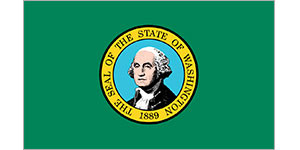 Washington
State is a classic case of a mostly rural state with a few cities that
carry the bulk of the political influence. Washington issues CCW permits
on a “shall issue” basis for only $7 per year. The state has a strong
use-of-force law and doesn’t require permits to purchase any category of
firearm. A ballot initiative requiring background checks and de facto
registration on all handgun transfers passed in November 2014. Tactical
rifles are unrestricted, but machine guns are no-go, even in-compliance
with federal law.
Washington
State is a classic case of a mostly rural state with a few cities that
carry the bulk of the political influence. Washington issues CCW permits
on a “shall issue” basis for only $7 per year. The state has a strong
use-of-force law and doesn’t require permits to purchase any category of
firearm. A ballot initiative requiring background checks and de facto
registration on all handgun transfers passed in November 2014. Tactical
rifles are unrestricted, but machine guns are no-go, even in-compliance
with federal law.
39. Minnesota
 Minnesota
is the quintessential Midwest state in which often visceral resistance
to political change makes passing pro-gun legislation more difficult.
Nonetheless, two omnibus pro-gun bills passed out of the legislature’s
respective chambers and were signed by Gov. Mark Dayton. Among the
various provisions of these bills is a measure that allows Minnesota
residents to own and hunt with suppressors in compliance with federal
law. For now, Minnesota remains a middle-of-the-road state with a “shall
issue” CCW system with few prohibited places enumerated by statute.
Minnesota’s use-of-force laws are strong, but CCW reciprocity is
minimal. NFA laws are a bit of a mixed bag, with Curio and Relic
(C&R) machine guns allowed along with SBRs.
Minnesota
is the quintessential Midwest state in which often visceral resistance
to political change makes passing pro-gun legislation more difficult.
Nonetheless, two omnibus pro-gun bills passed out of the legislature’s
respective chambers and were signed by Gov. Mark Dayton. Among the
various provisions of these bills is a measure that allows Minnesota
residents to own and hunt with suppressors in compliance with federal
law. For now, Minnesota remains a middle-of-the-road state with a “shall
issue” CCW system with few prohibited places enumerated by statute.
Minnesota’s use-of-force laws are strong, but CCW reciprocity is
minimal. NFA laws are a bit of a mixed bag, with Curio and Relic
(C&R) machine guns allowed along with SBRs.
38. Iowa
 Iowa
placed 16th in G&A’s last “Best States for CCW” ranking, with full
recognition of out-of-state permits and strong use-of-force laws.
Despite those strengths, the five-year retraining requirement for CCW
and pistol permit to purchase hurt the state’s score. Iowa’s state law
preempts municipalities from passing their own gun control regulations
other than discharge ordinances. NFA items are essentially banned but
for some narrow statutory exemptions. A bill to legalize suppressors
died in the legislature this session with the Senate failing to act.
Current law prohibits adults from teaching children under 14 to shoot a
handgun, which doesn’t exactly promote youth shooting sports such as the
Scholastic Pistol Program.
Iowa
placed 16th in G&A’s last “Best States for CCW” ranking, with full
recognition of out-of-state permits and strong use-of-force laws.
Despite those strengths, the five-year retraining requirement for CCW
and pistol permit to purchase hurt the state’s score. Iowa’s state law
preempts municipalities from passing their own gun control regulations
other than discharge ordinances. NFA items are essentially banned but
for some narrow statutory exemptions. A bill to legalize suppressors
died in the legislature this session with the Senate failing to act.
Current law prohibits adults from teaching children under 14 to shoot a
handgun, which doesn’t exactly promote youth shooting sports such as the
Scholastic Pistol Program.
37. Colorado
 A
legislative committee defeated two bills that would have reversed some
of Colorado’s most stringent gun control laws this year, continuing the
Californication of Colorado’s gun laws. Magpul left the state in
response to the 2013 magazine ban, which hardly helps the state in the
miscellaneous column. Colorado’s CCW remains a good one (with fees) with
strong reciprocity and few prohibited locations, but the state’s
use-of-force laws could use some strengthening. All NFA items are
allowed under state law. If you are a hunter, Colorado has lots going
for it, and there is a strong network of competitive shooters in the
state.
A
legislative committee defeated two bills that would have reversed some
of Colorado’s most stringent gun control laws this year, continuing the
Californication of Colorado’s gun laws. Magpul left the state in
response to the 2013 magazine ban, which hardly helps the state in the
miscellaneous column. Colorado’s CCW remains a good one (with fees) with
strong reciprocity and few prohibited locations, but the state’s
use-of-force laws could use some strengthening. All NFA items are
allowed under state law. If you are a hunter, Colorado has lots going
for it, and there is a strong network of competitive shooters in the
state.
36. New Mexico
 New
Mexico is a “shall issue” CCW state, but it includes some odd
provisions such as the maximum caliber a CCW holder can carry.
Use-of-force laws are pretty weak in New Mexico, with no Castle Doctrine
statute in effect. The state gets nine points in the NFA category, with
no specific restrictions. The wide-open spaces of the state provide
more shooting opportunities than most. The state places no restrictions
on black rifles or magazines, and permits to purchase are not required
for any flavor of firearm.
New
Mexico is a “shall issue” CCW state, but it includes some odd
provisions such as the maximum caliber a CCW holder can carry.
Use-of-force laws are pretty weak in New Mexico, with no Castle Doctrine
statute in effect. The state gets nine points in the NFA category, with
no specific restrictions. The wide-open spaces of the state provide
more shooting opportunities than most. The state places no restrictions
on black rifles or magazines, and permits to purchase are not required
for any flavor of firearm.
35. Ohio
 Things
have gotten remarkably better for Ohio’s gun owners since 2014.
Residents have seen the passage of pro-gun legislation, and those laws
have now taken effect. Suppressors are now legal for hunting, and CLEOs
must sign NFA transfer forms, which makes the already good Class 3
category even stronger. Additionally, training for CCW permits was
reduced from 12 hours down to eight. Ohio’s CCW law has been changed to
what is effectively a “full recognition” system, but the state does have
a somewhat restrictive list of prohibited locations. The state enacted a
Castle Doctrine law in 2008, but requires a particularly high burden of
proof in the case of self-defense. An awkward definition of “automatic
weapon” that created problems for certain firearms and magazines has
been fixed, allowing for max points in the tactical rifle category.
Things
have gotten remarkably better for Ohio’s gun owners since 2014.
Residents have seen the passage of pro-gun legislation, and those laws
have now taken effect. Suppressors are now legal for hunting, and CLEOs
must sign NFA transfer forms, which makes the already good Class 3
category even stronger. Additionally, training for CCW permits was
reduced from 12 hours down to eight. Ohio’s CCW law has been changed to
what is effectively a “full recognition” system, but the state does have
a somewhat restrictive list of prohibited locations. The state enacted a
Castle Doctrine law in 2008, but requires a particularly high burden of
proof in the case of self-defense. An awkward definition of “automatic
weapon” that created problems for certain firearms and magazines has
been fixed, allowing for max points in the tactical rifle category.
34. Nebraska
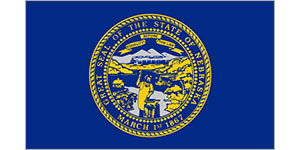 Change
comes slowly in the Cornhusker State. Getting any bills through
Nebraska’s unicameral is a challenge, and pro-gun bills are tougher than
most. Passage of the state’s CCW law took more than a decade, and
things have improved slowly since that watershed event in 2006. State
firearm preemption and “Stand Your Ground” bills are working their way
through the legislature but have been carried over, and passage is a
two-year prospect at best. Nebraska gets near-max points in the NFA
category, and being the home to several shooting ranges and industry
giants, including Cabela’s and Hornady, gives this state some cultural
points in the miscellaneous column. The use-of-force laws are relatively
mediocre, and an antiquated permit to purchase a handgun system remains
in effect decades after implementation of the NICS system.
Change
comes slowly in the Cornhusker State. Getting any bills through
Nebraska’s unicameral is a challenge, and pro-gun bills are tougher than
most. Passage of the state’s CCW law took more than a decade, and
things have improved slowly since that watershed event in 2006. State
firearm preemption and “Stand Your Ground” bills are working their way
through the legislature but have been carried over, and passage is a
two-year prospect at best. Nebraska gets near-max points in the NFA
category, and being the home to several shooting ranges and industry
giants, including Cabela’s and Hornady, gives this state some cultural
points in the miscellaneous column. The use-of-force laws are relatively
mediocre, and an antiquated permit to purchase a handgun system remains
in effect decades after implementation of the NICS system.
33. Michigan
 Gov.
Rick Snyder signed legislation this year strengthening and modernizing
the state’s CCW permit process, which is good news for folks in
Michigan. The state enjoys strong CCW reciprocity, but the list of
prohibited locations cost it some points. Last year, both short-barreled
rifles and shotguns became legal to own in Michigan, bringing the state
up to near full points in the NFA bucket. Michigan’s strong
self-defense laws give it 10 points in the Castle Doctrine category, and
Michigan’s proud culture as a hunting state gives it a boost in the
miscellaneous column.
Gov.
Rick Snyder signed legislation this year strengthening and modernizing
the state’s CCW permit process, which is good news for folks in
Michigan. The state enjoys strong CCW reciprocity, but the list of
prohibited locations cost it some points. Last year, both short-barreled
rifles and shotguns became legal to own in Michigan, bringing the state
up to near full points in the NFA bucket. Michigan’s strong
self-defense laws give it 10 points in the Castle Doctrine category, and
Michigan’s proud culture as a hunting state gives it a boost in the
miscellaneous column.
32. Idaho
 Idaho
is a strong state for gun owners, both culturally and legally. CCW
permits are issued to both residents and nonresidents, and the state
recognizes permits for every state that issues them. Holders of Idaho’s
“enhanced” CCW permit can actually carry on some college and university
campuses, which is fairly rare nationally. The state cleaned up its CCW
law this year, making it easier to interpret, and it lowered the fees.
The Gem State places no restrictions upon tactical rifles or NFA items
and has a ton of places to shoot. The only area where Idaho loses points
is with its relatively weak use-of-force laws. Though case law
establishes that there’s no duty to retreat in the state, there’s no
such provision in state statute, which makes things a bit murky. The
State of Idaho actually issues a Friends of the NRA license plate,
destined to get a road-tripper pulled over in the Mid-Atlantic or
Northeast.
Idaho
is a strong state for gun owners, both culturally and legally. CCW
permits are issued to both residents and nonresidents, and the state
recognizes permits for every state that issues them. Holders of Idaho’s
“enhanced” CCW permit can actually carry on some college and university
campuses, which is fairly rare nationally. The state cleaned up its CCW
law this year, making it easier to interpret, and it lowered the fees.
The Gem State places no restrictions upon tactical rifles or NFA items
and has a ton of places to shoot. The only area where Idaho loses points
is with its relatively weak use-of-force laws. Though case law
establishes that there’s no duty to retreat in the state, there’s no
such provision in state statute, which makes things a bit murky. The
State of Idaho actually issues a Friends of the NRA license plate,
destined to get a road-tripper pulled over in the Mid-Atlantic or
Northeast.
31. Arkansas
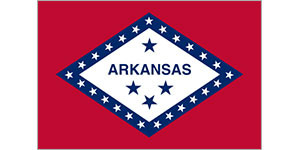 Gov.
Asa Hutchinson, a longtime friend of gun owners, signed an
unprecedented eight pro-gun bills into law in 2015, making it a landmark
year for gun owners in the Natural State. One of the bills removed the
prohibition on carrying on private school property and shifts that
decision to the schools themselves. Another provision allows active and
former members of the military including those in the National Guard and
Reserve to obtain a CCW at age 18. Immunity from civil damages for
citizens who used deadly force appropriately improves the state’s
previously weak use-of-force law. Arkansas gets nine points in the NFA
column and 10 in the tactical gun category.
Gov.
Asa Hutchinson, a longtime friend of gun owners, signed an
unprecedented eight pro-gun bills into law in 2015, making it a landmark
year for gun owners in the Natural State. One of the bills removed the
prohibition on carrying on private school property and shifts that
decision to the schools themselves. Another provision allows active and
former members of the military including those in the National Guard and
Reserve to obtain a CCW at age 18. Immunity from civil damages for
citizens who used deadly force appropriately improves the state’s
previously weak use-of-force law. Arkansas gets nine points in the NFA
column and 10 in the tactical gun category.
30. Oklahoma
 Oklahoma’s
self-defense statute got a boost in 2014 when Gov. Mary Fallin signed
legislation allowing the use of deadly force to defend any person, not
just a family member. The state has a “shall issue” permit system and
recognizes permits from all other states. Oklahoma gets max points in
the NFA category, as CLEOs must sign for transfers within 15 days,
preventing de facto bans in certain municipalities. Oklahoma places no
restrictions on tactical-looking firearms or magazines.
Oklahoma’s
self-defense statute got a boost in 2014 when Gov. Mary Fallin signed
legislation allowing the use of deadly force to defend any person, not
just a family member. The state has a “shall issue” permit system and
recognizes permits from all other states. Oklahoma gets max points in
the NFA category, as CLEOs must sign for transfers within 15 days,
preventing de facto bans in certain municipalities. Oklahoma places no
restrictions on tactical-looking firearms or magazines.
29. Maine
 Maine
is one of a few states in the Northeast that broke from the pack in
regard to gun laws. Maine has a “shall issue” CCW permit system, and
Gov. Paul LePage just signed a bill legalizing permitless carry in the
state. Maine’s law does allow permits to be denied for non-criminal
activity, which costs it some points, and reciprocity isn’t great for
many visitors. The state’s self-defense statutes leave something to be
desired, but NFA items and black rifles are fair game. A “shall sign”
bill requiring CLEOs to approve NFA applications is on the governor’s
desk awaiting his signature as this goes to print. The governor already
signed a bill strengthening the state’s reciprocity. Most of Maine is
very rural and boasts a strong gun and hunting culture.
Maine
is one of a few states in the Northeast that broke from the pack in
regard to gun laws. Maine has a “shall issue” CCW permit system, and
Gov. Paul LePage just signed a bill legalizing permitless carry in the
state. Maine’s law does allow permits to be denied for non-criminal
activity, which costs it some points, and reciprocity isn’t great for
many visitors. The state’s self-defense statutes leave something to be
desired, but NFA items and black rifles are fair game. A “shall sign”
bill requiring CLEOs to approve NFA applications is on the governor’s
desk awaiting his signature as this goes to print. The governor already
signed a bill strengthening the state’s reciprocity. Most of Maine is
very rural and boasts a strong gun and hunting culture.
28. Oregon
 Oregon’s
“shall issue” CCW law ranked 38th in the U.S. but only because of poor
reciprocity. The state has relatively strong use-of-force laws and
preempts cities and towns from passing their own restrictions on gun
owners. NFA items are legal as long as federal law is followed, and the
state places no restrictions on tactical-looking firearms or magazines.
The bad news is that a bill was just passed by the legislature and
signed by Gov. Kate Brown that will require background checks to be
performed on firearm transfers among private individuals.
Oregon’s
“shall issue” CCW law ranked 38th in the U.S. but only because of poor
reciprocity. The state has relatively strong use-of-force laws and
preempts cities and towns from passing their own restrictions on gun
owners. NFA items are legal as long as federal law is followed, and the
state places no restrictions on tactical-looking firearms or magazines.
The bad news is that a bill was just passed by the legislature and
signed by Gov. Kate Brown that will require background checks to be
performed on firearm transfers among private individuals.
27. South Dakota
 A
“D” grade by the Brady Campaign on South Dakota’s gun laws once
prompted a request by a South Dakota state senator to say, “Find out
what it takes to get an ‘F,’ and I’ll pass it.” To say that the state is
welcoming to gun owners would be an understatement. That sentiment
doesn’t always prevail in the state’s legislature, however. The senate
failed to pass CLEO “shall sign” legislation for NFA transfers. The same
senate committee also defeated a bill that would have abolished the
permit requirement for carrying a concealed firearm. SD’s current permit
system ranked 19th in our last “Best States for CCW” survey, thanks to
low fees and very few prohibited locations. The state does not restrict
black rifles or NFA items, and self-defense laws are strong.
A
“D” grade by the Brady Campaign on South Dakota’s gun laws once
prompted a request by a South Dakota state senator to say, “Find out
what it takes to get an ‘F,’ and I’ll pass it.” To say that the state is
welcoming to gun owners would be an understatement. That sentiment
doesn’t always prevail in the state’s legislature, however. The senate
failed to pass CLEO “shall sign” legislation for NFA transfers. The same
senate committee also defeated a bill that would have abolished the
permit requirement for carrying a concealed firearm. SD’s current permit
system ranked 19th in our last “Best States for CCW” survey, thanks to
low fees and very few prohibited locations. The state does not restrict
black rifles or NFA items, and self-defense laws are strong.
26. North Dakota
 North
Dakota finished 6th in the nation for its CCW laws in 2014, and it does
well across the board for gun owners. Governor Jack Dalrymple has
signed a stack of pro-gun bills in 2015, including one that requires
CLEOs to sign for NFA transfers within 30 days. Another bill expanded
the rights of CCW permit holders, and a third bill allows both employees
and students of universities to store firearms in their vehicles on
campus. North Dakota has strong use-of-force laws and places no unusual
restrictions or purchase requirements on gun owners.
North
Dakota finished 6th in the nation for its CCW laws in 2014, and it does
well across the board for gun owners. Governor Jack Dalrymple has
signed a stack of pro-gun bills in 2015, including one that requires
CLEOs to sign for NFA transfers within 30 days. Another bill expanded
the rights of CCW permit holders, and a third bill allows both employees
and students of universities to store firearms in their vehicles on
campus. North Dakota has strong use-of-force laws and places no unusual
restrictions or purchase requirements on gun owners.
25. Wisconsin
 Life
improved markedly for gun-owning Wisconsin residents when former Gov.
Jim Doyle was replaced by Gov. Scott Walker. Wisconsin’s hard-won CCW
law gets good marks for strong reciprocity and very limited “gun-free
zones.” The state has a Castle Doctrine statute on the books and doesn’t
restrict NFA items or tactical-looking firearms. A bill to repeal the
state’s 48-hour waiting period on handgun purchases was recently signed
by Gov. Walker, yet another step forward for gun owners. Milwaukee
County Sheriff David Clarke is about as outspokenly pro-gun as it gets,
which is a rare thing in a major metro area.
Life
improved markedly for gun-owning Wisconsin residents when former Gov.
Jim Doyle was replaced by Gov. Scott Walker. Wisconsin’s hard-won CCW
law gets good marks for strong reciprocity and very limited “gun-free
zones.” The state has a Castle Doctrine statute on the books and doesn’t
restrict NFA items or tactical-looking firearms. A bill to repeal the
state’s 48-hour waiting period on handgun purchases was recently signed
by Gov. Walker, yet another step forward for gun owners. Milwaukee
County Sheriff David Clarke is about as outspokenly pro-gun as it gets,
which is a rare thing in a major metro area.
24. Virginia
 When
it comes to gun laws, crossing the Memorial Bridge from D.C. to
Virginia is about like passing westward through the Brandenburg Gate
during the Cold War. Virginia has a well-ranked CCW law, and open carry
is legal throughout the state, thanks to a strong preemption statute.
NFA items are legal with the exception of the Striker 12 shotgun (which
is classified as a “destructive device,” according to the BATF), but
Gov. Terry McAuliffe vetoed “shall sign” legislation relating to NFA
transfers. Tactical-looking rifles may not be possessed by persons under
age 18 in the Commonwealth, which costs it some points in that
category.
When
it comes to gun laws, crossing the Memorial Bridge from D.C. to
Virginia is about like passing westward through the Brandenburg Gate
during the Cold War. Virginia has a well-ranked CCW law, and open carry
is legal throughout the state, thanks to a strong preemption statute.
NFA items are legal with the exception of the Striker 12 shotgun (which
is classified as a “destructive device,” according to the BATF), but
Gov. Terry McAuliffe vetoed “shall sign” legislation relating to NFA
transfers. Tactical-looking rifles may not be possessed by persons under
age 18 in the Commonwealth, which costs it some points in that
category.
23. Tennessee
 Tennessee’s
generally strong gun laws got a little stronger this year with the
passage of several pro-gun bills. A “shall sign” NFA bill requires CLEOs
to approve transfers within 15 days, and the state does not restrict
any NFA items. Tennessee’s CCW law gets high marks, and a lifetime
permit is now available, thanks to one of the aforementioned bills
signed by Gov. Bill Haslam. The Volunteer State has a strong Castle
Doctrine statute, and black rifles and magazines are unrestricted.
Beretta’s decision to relocate operations to Tennessee along with the
welcome mat thrown down for the NRA Convention by Nashvillians speak to a
strong pro-gun culture.
Tennessee’s
generally strong gun laws got a little stronger this year with the
passage of several pro-gun bills. A “shall sign” NFA bill requires CLEOs
to approve transfers within 15 days, and the state does not restrict
any NFA items. Tennessee’s CCW law gets high marks, and a lifetime
permit is now available, thanks to one of the aforementioned bills
signed by Gov. Bill Haslam. The Volunteer State has a strong Castle
Doctrine statute, and black rifles and magazines are unrestricted.
Beretta’s decision to relocate operations to Tennessee along with the
welcome mat thrown down for the NRA Convention by Nashvillians speak to a
strong pro-gun culture.
22. Nevada
 Once
a year, Nevada becomes the home of America’s gun industry when the
National Shooting Sports Foundation’s SHOT Show rolls into town.
Nevada’s gun owners saw positive changes during 2015 with some major
pro-gun victories taking place in the statehouse. Handgun registration
is officially a thing of the past in Las Vegas, and Nevada’s CCW
reciprocity got a boost with the passage of a bill signed by Gov. Brian
Sandoval that expands reciprocity to 23 states. The state’s Castle
Doctrine statute was also extended to include citizens’ vehicles. Nevada
does issue permits to nonresidents. As the world’s most popular
“machine gun tourism” spot, Nevada does not restrict NFA items. The
state has good self-defense laws and does not restrict black rifles or
magazine capacity.
Once
a year, Nevada becomes the home of America’s gun industry when the
National Shooting Sports Foundation’s SHOT Show rolls into town.
Nevada’s gun owners saw positive changes during 2015 with some major
pro-gun victories taking place in the statehouse. Handgun registration
is officially a thing of the past in Las Vegas, and Nevada’s CCW
reciprocity got a boost with the passage of a bill signed by Gov. Brian
Sandoval that expands reciprocity to 23 states. The state’s Castle
Doctrine statute was also extended to include citizens’ vehicles. Nevada
does issue permits to nonresidents. As the world’s most popular
“machine gun tourism” spot, Nevada does not restrict NFA items. The
state has good self-defense laws and does not restrict black rifles or
magazine capacity.
21. West Virginia
 NFA
enthusiasts in West Virginia got a boost when Gov. Earl Ray Tomblin
autographed a “shall sign” bill in 2015 requiring CLEOs to approve NFA
forms within 30 days unless the applicant is prohibited from owning the
item in question. Unfortunately, the governor vetoed a bill that would
have allowed for permitless concealed carry. West Virginia ranks high in
just about every category, with no restrictions on NFA items or
tactical-looking firearms. The state’s self-defense laws are good, and
CCW reciprocity is broad.
NFA
enthusiasts in West Virginia got a boost when Gov. Earl Ray Tomblin
autographed a “shall sign” bill in 2015 requiring CLEOs to approve NFA
forms within 30 days unless the applicant is prohibited from owning the
item in question. Unfortunately, the governor vetoed a bill that would
have allowed for permitless concealed carry. West Virginia ranks high in
just about every category, with no restrictions on NFA items or
tactical-looking firearms. The state’s self-defense laws are good, and
CCW reciprocity is broad.
20. Pennsylvania
 Pennsylvania’s
biggest gun issue has always been the battle between gun owners and
municipalities. Last fall, outgoing-Gov. Tom Corbett signed a strong
preemption bill to ensure that gun laws are consistent across the
Keystone State and allows groups such as the National Rifle Association
to sue cities that defy state gun laws. A lawsuit against gun control
ordinances in Philadelphia, Lancaster and Pittsburg was filed by the NRA
in January. Preemption battles aside, Pennsylvania has a strong Castle
Doctrine law, it doesn’t restrict tactical firearms, and all NFA items
are available.
Pennsylvania’s
biggest gun issue has always been the battle between gun owners and
municipalities. Last fall, outgoing-Gov. Tom Corbett signed a strong
preemption bill to ensure that gun laws are consistent across the
Keystone State and allows groups such as the National Rifle Association
to sue cities that defy state gun laws. A lawsuit against gun control
ordinances in Philadelphia, Lancaster and Pittsburg was filed by the NRA
in January. Preemption battles aside, Pennsylvania has a strong Castle
Doctrine law, it doesn’t restrict tactical firearms, and all NFA items
are available.
19. North Carolina
 A
bill that would improve various gun laws in North Carolina is currently
moving through the state legislature but is running short on time. The
bill would remove the handgun permit requirement currently in statute as
well as create a “shall sign” requirement for NFA transactions. Under
current law, NFA items are allowed in North Carolina, but machine guns
require a permit from the county sheriff, and there’s nothing to
guarantee that one will be granted. North Carolina recognizes CCW
permits from all states, which is good news for visitors. The state has
good use-of-force laws and does not place restrictions on tactical
firearms.
A
bill that would improve various gun laws in North Carolina is currently
moving through the state legislature but is running short on time. The
bill would remove the handgun permit requirement currently in statute as
well as create a “shall sign” requirement for NFA transactions. Under
current law, NFA items are allowed in North Carolina, but machine guns
require a permit from the county sheriff, and there’s nothing to
guarantee that one will be granted. North Carolina recognizes CCW
permits from all states, which is good news for visitors. The state has
good use-of-force laws and does not place restrictions on tactical
firearms.
18. Mississippi
 Mississippi
ranked 20th in G&A’s survey of CCW laws for its wide reciprocity
and strong Castle Doctrine statute, and the state’s carry laws just got
even stronger. A bill was recently signed into law that eliminates the
CCW permit requirement for “off body” carry in purses, briefcases and
similar containers. Permit fees are also reduced under the new law, and a
separate bill signed by Gov. Phil
Mississippi
ranked 20th in G&A’s survey of CCW laws for its wide reciprocity
and strong Castle Doctrine statute, and the state’s carry laws just got
even stronger. A bill was recently signed into law that eliminates the
CCW permit requirement for “off body” carry in purses, briefcases and
similar containers. Permit fees are also reduced under the new law, and a
separate bill signed by Gov. Phil
Bryant assists veterans in obtaining CCW permits. Mississippi places no
restrictions on tactical firearms, magazine capacity or NFA items. This
survey isn’t specifically about hunting, but a 2014 ballot initiative to
guarantee the rights of hunters is a good harbinger of Mississippi
residents’ attitudes toward firearms. The measure passed with 88 percent
of the vote.
17. Louisiana
 Louisiana
has a very strong “Stand Your Ground” statute and wide CCW reciprocity,
which is good news, since your chances of being a crime victim in New
Orleans are pretty decent. Louisiana does not restrict NFA items, and as
of 2014, it allows suppressors to be used when hunting.
Louisiana
has a very strong “Stand Your Ground” statute and wide CCW reciprocity,
which is good news, since your chances of being a crime victim in New
Orleans are pretty decent. Louisiana does not restrict NFA items, and as
of 2014, it allows suppressors to be used when hunting.
16. Indiana
 Indiana’s
CCW is among the strongest in the nation, with permits issued without
training to residents and nonresidents for only $10 per year. If you’re
an open-carry kind of person, that’s fine with the Hoosier State. The
state recognizes permits from all other states, and the use-of-force
laws get 8 out of 10 points. Short-barreled shotguns (SBSs) are now
allowed under state law as of July 1, and no restrictions are imposed
upon tactical firearms or magazine capacity.
Indiana’s
CCW is among the strongest in the nation, with permits issued without
training to residents and nonresidents for only $10 per year. If you’re
an open-carry kind of person, that’s fine with the Hoosier State. The
state recognizes permits from all other states, and the use-of-force
laws get 8 out of 10 points. Short-barreled shotguns (SBSs) are now
allowed under state law as of July 1, and no restrictions are imposed
upon tactical firearms or magazine capacity.
15. Texas
 At
the stroke of Gov. Greg Abbott’s pen, Texans can stroll around the
entire Lone Star State with a gun openly carried starting on Jan. 1,
2016. CCW permits are issued to both residents and nonresidents, and the
state has very good reciprocity. Carrying a long gun openly is already
legal, as evidenced by the recent media attention on the subject. Texas
has strong use-of-force laws, and all tactical-looking firearms and NFA
items are welcome.
At
the stroke of Gov. Greg Abbott’s pen, Texans can stroll around the
entire Lone Star State with a gun openly carried starting on Jan. 1,
2016. CCW permits are issued to both residents and nonresidents, and the
state has very good reciprocity. Carrying a long gun openly is already
legal, as evidenced by the recent media attention on the subject. Texas
has strong use-of-force laws, and all tactical-looking firearms and NFA
items are welcome.
14. South Carolina
 South
Carolina gets max points for its Castle Doctrine statute, but its CCW
laws could be better. The Palmetto State’s reciprocity isn’t great, and
the list of locations where carrying isn’t allowed is rather long. The
reciprocity issues could have been addressed by the legislature this
year but they failed to pass the bill in question, which was amended to
contain permitless carry. Otherwise, South Carolina gets nearly top
marks in every category, with no restrictions on what types of firearms
can be owned or possessed in the state.
South
Carolina gets max points for its Castle Doctrine statute, but its CCW
laws could be better. The Palmetto State’s reciprocity isn’t great, and
the list of locations where carrying isn’t allowed is rather long. The
reciprocity issues could have been addressed by the legislature this
year but they failed to pass the bill in question, which was amended to
contain permitless carry. Otherwise, South Carolina gets nearly top
marks in every category, with no restrictions on what types of firearms
can be owned or possessed in the state.
13. Georgia
 Georgia’s
strong gun laws got even stronger in 2014 when Gov. Nathan Deal signed a
sweeping pro-gun bill. Georgia’s use-of-force law is among the
strongest in the nation, and cities such as Atlanta cannot regulate any
aspect of gun ownership except for where a gun can be discharged. All
NFA items are allowed in the state as long as federal law is complied
with, and black rifles are unrestricted. Georgia will lose a bit of its
gun culture cachet when Freedom Group moves Advanced Armament
Corporation to Alabama this year, but Daniel Defense remains in Black
Creek, and Polycase now manufactures ammunition near Savannah.
Georgia’s
strong gun laws got even stronger in 2014 when Gov. Nathan Deal signed a
sweeping pro-gun bill. Georgia’s use-of-force law is among the
strongest in the nation, and cities such as Atlanta cannot regulate any
aspect of gun ownership except for where a gun can be discharged. All
NFA items are allowed in the state as long as federal law is complied
with, and black rifles are unrestricted. Georgia will lose a bit of its
gun culture cachet when Freedom Group moves Advanced Armament
Corporation to Alabama this year, but Daniel Defense remains in Black
Creek, and Polycase now manufactures ammunition near Savannah.
12. Florida
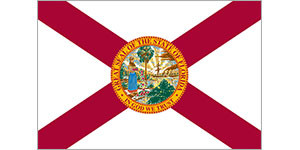 An
effort to allow guns to be carried on college campuses in Florida was
defeated when the Florida House of Representatives went home four days
early this session. For many years, Florida’s gun laws have been the
envy of gun owners nationwide. The Sunshine State places no restrictions
upon modern firearms, magazines or NFA items, and the state has a
healthy competitive shooting network. Finding a place to shoot in the
larger metropolitan areas was a challenge for many years, but the
private sector has responded to the demand, and ranges can now be found
in nearly every corner of the state.
An
effort to allow guns to be carried on college campuses in Florida was
defeated when the Florida House of Representatives went home four days
early this session. For many years, Florida’s gun laws have been the
envy of gun owners nationwide. The Sunshine State places no restrictions
upon modern firearms, magazines or NFA items, and the state has a
healthy competitive shooting network. Finding a place to shoot in the
larger metropolitan areas was a challenge for many years, but the
private sector has responded to the demand, and ranges can now be found
in nearly every corner of the state.
11. Montana
 Montana
has legalized the use of suppressors when hunting. A bill that would
have extended the rights of gun owners on college and university
campuses was defeated in the house after making it through the senate,
and Gov. Steve Bullock vetoed a bill that would establish permitless
carry across the state. Under current law, permitless carry is generally
legal outside of the cities, but this bill would have extended that
right from border to border. Montana has a model Castle Doctrine law and
places no restrictions on semiautomatic firearms or NFA items. The gun
culture in this state is as strong as it gets with one of the
fastest-growing gun industry presences in the nation. The Flathead
Valley around Kalispell is loaded with everything from custom-gun makers
to innovative barrel manufacturers.
Montana
has legalized the use of suppressors when hunting. A bill that would
have extended the rights of gun owners on college and university
campuses was defeated in the house after making it through the senate,
and Gov. Steve Bullock vetoed a bill that would establish permitless
carry across the state. Under current law, permitless carry is generally
legal outside of the cities, but this bill would have extended that
right from border to border. Montana has a model Castle Doctrine law and
places no restrictions on semiautomatic firearms or NFA items. The gun
culture in this state is as strong as it gets with one of the
fastest-growing gun industry presences in the nation. The Flathead
Valley around Kalispell is loaded with everything from custom-gun makers
to innovative barrel manufacturers.
10. New Hampshire
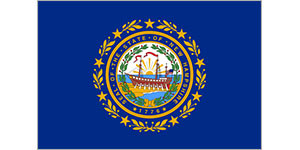 A
bill establishing permitless carry has passed out of both houses of the
legislature in the Granite State, but a veto by Gov. Maggie Hassan is
likely. New Hampshire finished eighth in our “Best States for CCW”
review, so it still gets strong points for CCW laws. Permits to carry in
New Hampshire are inexpensive, quick to obtain and enjoy good
reciprocity. The state gets full points in the Castle Doctrine column
and, unlike most of the Northeast, does not restrict tactical firearms,
magazine capacity or NFA items. There’s virtually no gun-related crime
in New Hampshire, so it must be doing something right.
A
bill establishing permitless carry has passed out of both houses of the
legislature in the Granite State, but a veto by Gov. Maggie Hassan is
likely. New Hampshire finished eighth in our “Best States for CCW”
review, so it still gets strong points for CCW laws. Permits to carry in
New Hampshire are inexpensive, quick to obtain and enjoy good
reciprocity. The state gets full points in the Castle Doctrine column
and, unlike most of the Northeast, does not restrict tactical firearms,
magazine capacity or NFA items. There’s virtually no gun-related crime
in New Hampshire, so it must be doing something right.
9. Missouri
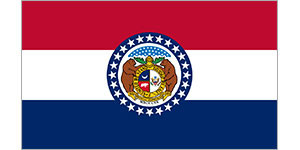 Missouri
is one of those states that has done an about-face on its gun laws in
the past several years. A ballot initiative affirming the Second
Amendment rights of Missouri residents passed with more than 60 percent
of the votes in August 2014. Known once as one of the last holdouts
against CCW, the Show Me State is now ahead of the curve when it comes
to gun rights. The state’s CCW regs could be better, with lots of
prohibited locations and high permit fees, but reciprocity is strong.
Unfortunately, permits are only issued to residents. Missouri gets full
points in the tactical gun category, and all NFA items are available as
long as the ATF approves.
Missouri
is one of those states that has done an about-face on its gun laws in
the past several years. A ballot initiative affirming the Second
Amendment rights of Missouri residents passed with more than 60 percent
of the votes in August 2014. Known once as one of the last holdouts
against CCW, the Show Me State is now ahead of the curve when it comes
to gun rights. The state’s CCW regs could be better, with lots of
prohibited locations and high permit fees, but reciprocity is strong.
Unfortunately, permits are only issued to residents. Missouri gets full
points in the tactical gun category, and all NFA items are available as
long as the ATF approves.
8. Kansas
 Kansas
went from one of four states without a CCW statute in 2005 to one of
few states approving permitless carry in 2015. What a difference 10
years and a pro-gun governor can make. Open carry has always been legal
in Kansas, but local governments used to ban it by municipal ordinance.
That’s no longer true as of July 2014. CLEOs “shall sign” NFA forms
within 15 days in Kansas, giving the state full points in the NFA
column. Taxpayer-funded firearm “buyback” programs have also been banned
by the state legislature. Under the leadership of strong pro-gun
advocates such as Speaker of the House Ray Merrick, Kansas has become
one of the strongest states for gun owners in the nation.
Kansas
went from one of four states without a CCW statute in 2005 to one of
few states approving permitless carry in 2015. What a difference 10
years and a pro-gun governor can make. Open carry has always been legal
in Kansas, but local governments used to ban it by municipal ordinance.
That’s no longer true as of July 2014. CLEOs “shall sign” NFA forms
within 15 days in Kansas, giving the state full points in the NFA
column. Taxpayer-funded firearm “buyback” programs have also been banned
by the state legislature. Under the leadership of strong pro-gun
advocates such as Speaker of the House Ray Merrick, Kansas has become
one of the strongest states for gun owners in the nation.
7. Alabama
 In
2014, Alabama residents voted overwhelmingly to adopt ballot
initiatives to strengthen the right to keep and bear arms in the state
as well as affirm the right to hunt. Alabama’s economy got a boost as
well, as the giant Remington Outdoor Group (formerly Freedom Group) is
in the process of consolidating nearly all of its operations to one big
facility in Huntsville. Sweet Home Alabama will now be home to one of
the largest firearm industry operations in the nation. Obtaining a CCW
permit is quick and easy and does not require training. Gov. Bentley
just signed a bill into law repealing the state’s antiquated pistol
registration scheme as well as the overly restrictive pistol possession
law for minors, which is great news for Alabama residents. Alabama’s
Castle Doctrine law is very strong, and no restrictions are placed on
tactical firearms or NFA items. Competitive shooting is popular in most
of the state, and the Civilian Marksmanship Program’s range in Anniston
is fantastic.
In
2014, Alabama residents voted overwhelmingly to adopt ballot
initiatives to strengthen the right to keep and bear arms in the state
as well as affirm the right to hunt. Alabama’s economy got a boost as
well, as the giant Remington Outdoor Group (formerly Freedom Group) is
in the process of consolidating nearly all of its operations to one big
facility in Huntsville. Sweet Home Alabama will now be home to one of
the largest firearm industry operations in the nation. Obtaining a CCW
permit is quick and easy and does not require training. Gov. Bentley
just signed a bill into law repealing the state’s antiquated pistol
registration scheme as well as the overly restrictive pistol possession
law for minors, which is great news for Alabama residents. Alabama’s
Castle Doctrine law is very strong, and no restrictions are placed on
tactical firearms or NFA items. Competitive shooting is popular in most
of the state, and the Civilian Marksmanship Program’s range in Anniston
is fantastic.
6. Wyoming
 Wyoming
probably has more guns than people, but that didn’t stop a senate
committee from gutting a bill that would have allowed for carry on all
government property, including schools. As one of the states that allows
for both permitted and permitless carry, the Cowboy State gets full
points in the CCW category. The only thing that hurts Wyoming’s score a
bit is its use-of-force laws, which are good but not ideal. Wyoming has
very few prohibited locations for carry and doesn’t restrict any type of
firearm or magazine. Its gun and hunting culture is about as good as it
gets, as it is thus far unspoiled by massive numbers of transplants
looking to love it to death (compare with Californians moving to and
changing Colorado).
Wyoming
probably has more guns than people, but that didn’t stop a senate
committee from gutting a bill that would have allowed for carry on all
government property, including schools. As one of the states that allows
for both permitted and permitless carry, the Cowboy State gets full
points in the CCW category. The only thing that hurts Wyoming’s score a
bit is its use-of-force laws, which are good but not ideal. Wyoming has
very few prohibited locations for carry and doesn’t restrict any type of
firearm or magazine. Its gun and hunting culture is about as good as it
gets, as it is thus far unspoiled by massive numbers of transplants
looking to love it to death (compare with Californians moving to and
changing Colorado).
5. Kentucky
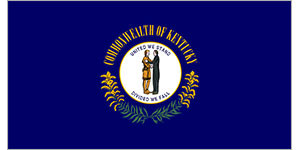 Kentucky
has always done well in the gun rights rankings with statutes and a
culture consistently friendly toward gun owners. The state gets full
points for its Castle Doctrine law, and G&A last ranked it as number
11 nationally in CCW. Kentucky passed a bill this year modernizing some
of the training standards for its CCW permits, making the process to
obtain a permit potentially even easier. Kentucky has a CLEO “shall
sign” law in place and gets full points in the tactical firearm column.
With a strong 47 points, its score remains unchanged for 2015.
Kentucky
has always done well in the gun rights rankings with statutes and a
culture consistently friendly toward gun owners. The state gets full
points for its Castle Doctrine law, and G&A last ranked it as number
11 nationally in CCW. Kentucky passed a bill this year modernizing some
of the training standards for its CCW permits, making the process to
obtain a permit potentially even easier. Kentucky has a CLEO “shall
sign” law in place and gets full points in the tactical firearm column.
With a strong 47 points, its score remains unchanged for 2015.
4. Utah
 An
effort to establish permitless carry in Utah failed this year when the
senate bill died on the calendar in the house. Still, Utah’s gun laws
are very strong by national standards. Utah actually finished second in
G&A’s CCW lineup due to the totality of its CCW law. Utah recognizes
permits from anywhere, its fees are low at $10 annually, and it issues
permits to nonresidents. Utah requires CLEOs to sign for NFA items, and
it places no restrictions on tactical-type firearms. Its self-defense
statutes are a model for the nation, and the gun culture in the state is
widespread.
An
effort to establish permitless carry in Utah failed this year when the
senate bill died on the calendar in the house. Still, Utah’s gun laws
are very strong by national standards. Utah actually finished second in
G&A’s CCW lineup due to the totality of its CCW law. Utah recognizes
permits from anywhere, its fees are low at $10 annually, and it issues
permits to nonresidents. Utah requires CLEOs to sign for NFA items, and
it places no restrictions on tactical-type firearms. Its self-defense
statutes are a model for the nation, and the gun culture in the state is
widespread.
3. Alaska
 What
can you say about a state that basically has it all? Alaska allows you
to carry with or without a permit, openly or concealed. You can own
anything that the feds don’t ban, and you have millions of acres of
public land on which to shoot. Alaska doesn’t compel CLEOs to sign for
NFA items, but G&A knows of none who have refused to do so. Hunting
in Alaska is world class, and it’s the one state where carrying a gun is
probably more likely to protect you from four-legged predators than
from the more common two-legged variety.
What
can you say about a state that basically has it all? Alaska allows you
to carry with or without a permit, openly or concealed. You can own
anything that the feds don’t ban, and you have millions of acres of
public land on which to shoot. Alaska doesn’t compel CLEOs to sign for
NFA items, but G&A knows of none who have refused to do so. Hunting
in Alaska is world class, and it’s the one state where carrying a gun is
probably more likely to protect you from four-legged predators than
from the more common two-legged variety.
2. Vermont
 If
there were a category for most overrated state for gun owners, it would
go to Vermont. Don’t get us wrong; G&A loves the Green Mountain
State for its gun laws (or lack thereof), but the culture of the state
is not as pro-gun as many think. Vermont is increasingly being populated
by New Yorkers, and many of those people would love to import the
strict gun control laws that they were subject to in the ironically
named Empire State. The Michael Bloomberg-backed mayor of Burlington,
Miro Weinberger, has sought to impose his own gun control laws, and only
the state’s preemption law and a 7 to 1 vote by a house committee held
his efforts at bay. A bill to create “universal” background checks as
well as an attack on the state’s preemption statute were defeated this
session. Efforts to gut the state’s range protection bill as well as a
bill to effectively ban lead ammo failed before the legislature in 2015.
It’s hard to crown Vermont as the champion of all things good for gun
owners with attacks like these happening on a regular basis. Vermont
remains the sole state with only a permitless carry system, with no
method of obtaining a permit for the purpose of reciprocity. On the
bright side, Vermont Gov. Peter Shumlin just signed a bill legalizing
suppressor possession and ownership in the state. The state also does
well in each of the substantive categories listed, but we can’t justify
full points in the miscellaneous column.
If
there were a category for most overrated state for gun owners, it would
go to Vermont. Don’t get us wrong; G&A loves the Green Mountain
State for its gun laws (or lack thereof), but the culture of the state
is not as pro-gun as many think. Vermont is increasingly being populated
by New Yorkers, and many of those people would love to import the
strict gun control laws that they were subject to in the ironically
named Empire State. The Michael Bloomberg-backed mayor of Burlington,
Miro Weinberger, has sought to impose his own gun control laws, and only
the state’s preemption law and a 7 to 1 vote by a house committee held
his efforts at bay. A bill to create “universal” background checks as
well as an attack on the state’s preemption statute were defeated this
session. Efforts to gut the state’s range protection bill as well as a
bill to effectively ban lead ammo failed before the legislature in 2015.
It’s hard to crown Vermont as the champion of all things good for gun
owners with attacks like these happening on a regular basis. Vermont
remains the sole state with only a permitless carry system, with no
method of obtaining a permit for the purpose of reciprocity. On the
bright side, Vermont Gov. Peter Shumlin just signed a bill legalizing
suppressor possession and ownership in the state. The state also does
well in each of the substantive categories listed, but we can’t justify
full points in the miscellaneous column.
1. Arizona
 Still
the reigning champion, Arizona combines strong laws with an unmatched
shooting culture and strong industry presence. An effort to strengthen
the state’s preemption law failed to make it out of the legislature this
year, but a clarifying bill did pass, specifying that the transfer of
firearms was immune from administrative or municipal regulation. Arizona
gets full points in every category with both permitless and permitted
carry, strong self-defense laws, a “shall sign” NFA statue and a
thriving competitive shooting scene. Whether you’re into ISPC-style
shooting, 3-Gun, long-range rifles, Cowboy matches, shotgunning or just
shooting machine guns in the desert, Arizona has everyone covered.
Still
the reigning champion, Arizona combines strong laws with an unmatched
shooting culture and strong industry presence. An effort to strengthen
the state’s preemption law failed to make it out of the legislature this
year, but a clarifying bill did pass, specifying that the transfer of
firearms was immune from administrative or municipal regulation. Arizona
gets full points in every category with both permitless and permitted
carry, strong self-defense laws, a “shall sign” NFA statue and a
thriving competitive shooting scene. Whether you’re into ISPC-style
shooting, 3-Gun, long-range rifles, Cowboy matches, shotgunning or just
shooting machine guns in the desert, Arizona has everyone covered.
*Editor’s note: State-specific gun laws are a complicated, frustrating and fluid subject. We have consulted sources such as the National Rifle Association, National Shooting Sports Foundation and state and law enforcement agencies to compile these rankings. Some states are very hazy on certain statutes, so our data reflects those confusions with general statements based on our understanding of the law. All information is current as of July 2015.


 Ammo 값이 착하다고 해서 퍼왔습니다.
Ammo 값이 착하다고 해서 퍼왔습니다.
 구글링 간단한 팁
구글링 간단한 팁
